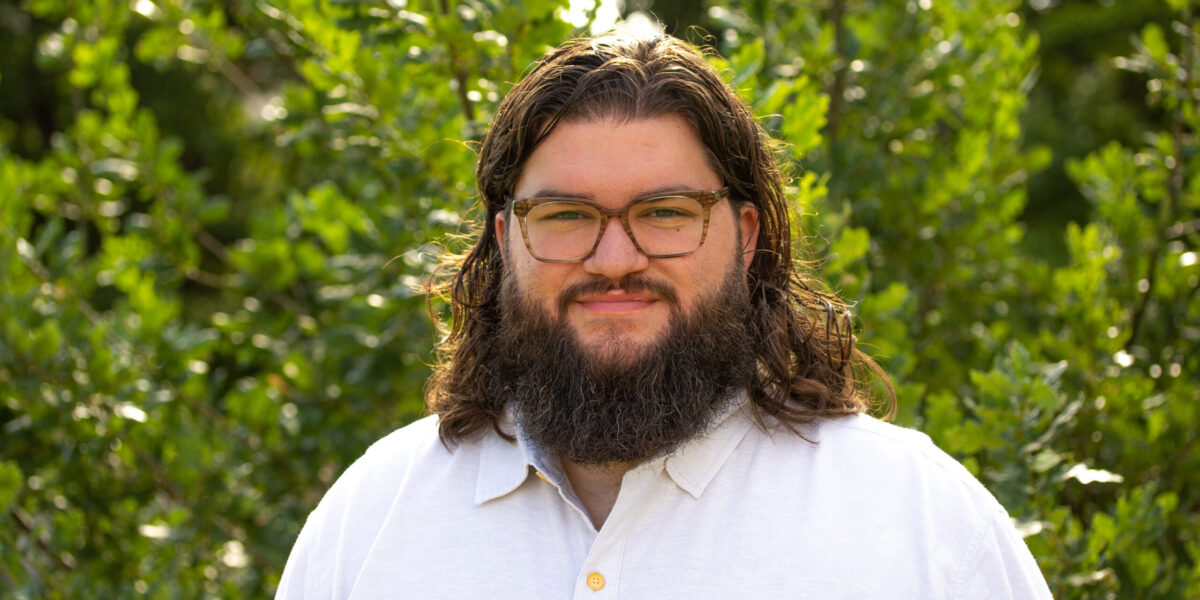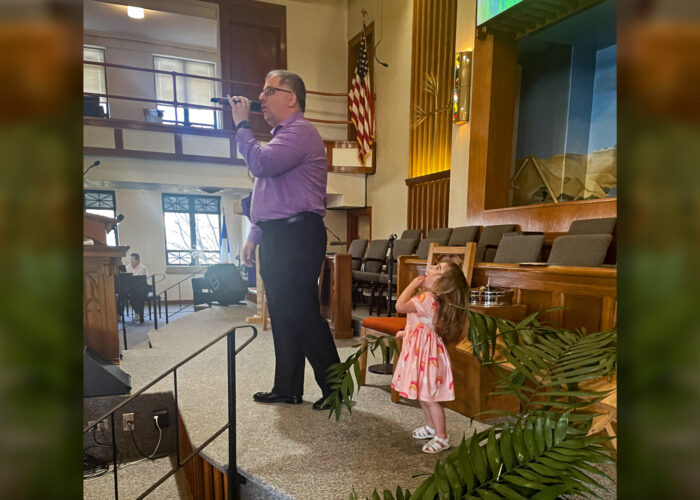Every organization has a purpose; an answer to the deceptively simple question, “Why?” At Mennonite Mission Network, that “why?” is to lead, mobilize and equip the church to participate in holistic witness to Jesus Christ — across the street, all through the marketplaces and around the world.
In this Q&A series, Mission Network asks staff members to think about the role they play in the agency, and how they see their daily work joining into what God is doing around the world.
Alex Mace reflects on his role as program director for Mennonite Voluntary Service (MVS) and Training and Resources assistant.
What brought you to your role with Mission Network?
I wanted to be in an organization that cared about the things that I care about.
For the MVS program director role, I started assisting the former program director in spring of 2023 and through that process, I really began to see the benefit of the MVS and Service Adventure programs.
When the former program director left, I wasn’t sure that I could do both programs. Michael Oyer, the director of Service Adventure, had taken on more responsibilities in the MVS and Service Adventure programs, and I had taken on more responsibilities as well. And we asked, what it would have look like if we were separate directors for these programs, but we work together and share the responsibilities in some way. We both feel like we have giftings in different areas, and we work well together.
I really value the MVS program, and I want it to succeed. And now being program director, there’s a lot that I have to think about, but it’s still that foundational idea that we’re offering a transformational experience for young people, and that is a great thing to be a part of.
For my role with training and resources, I started in the training and resources department when I came to Mission Network, and I really value the work of transformation. In the training and resources department, we are creating opportunities for people to learn. That’s mostly centered around mission. Sometimes it is very practical, like for our international service workers or for people in our agency, but for the most part, it is helping people to think about things in a different way. That work is really fundamental for who I am as a person.
What is your favorite part of your role with Mission Network?
All the meetings!
No, I really appreciate seeing our work bear fruit. You think of an idea, you work on it and work on it, and then you vet it through other people. For training resources, that’s the good kind of work that I enjoy doing, for the MVS side, there are some times where I think oh man, this is the slog work. I’ve got to make sure that these things are signed and all that sort of stuff. But the really good moments of the MVS work are hearing the stories from the participants and hearing things like, ‘I had this phenomenal experience with my placement, and I learned so much, and I did this thing, and I want to do another year of MVS.’ Currently, we have four people right now that are thinking about doing a second year in the program and that speaks a lot to program, and our local leaders and the work and effort that they put into these people’s lives.
How has your perspective on your role with Mission Network changed over your time with the agency?
I don’t have a Mennonite background, so there was a bit of a learning curve that I had on the practical expressions of theology and faith within an Anabaptist Mennonite perspective. Like, peace and justice. Growing up, that was mostly about faith and pietism and so for me that shift has been really, really important in terms of how I approach the work. It’s also given me this strong love and enjoyment of the fact that when we talk about peace and justice, we’re not simply doing so because it’s the right thing to do.
It’s an expression of our faith in Christ, and an outpouring of His love that we’re doing these things.
Understanding the Anabaptist understanding of peace and justice, gospel and mission has been huge for understanding how my role works, and what I do, and how do I frame things in a way that makes sense.
How do you view your role with Mission Network fitting into God’s mission for the church?
My role fits in a lot of different ways. I see it fitting in terms of the training and resources that we provide pastors and leaders in congregations; tools that we provide to the denomination, and we provide international service workers with tools to do their work. I may not be on the frontline expression of what God is doing in terms of mission, but I’m part of resourcing the church to think through how mission is operating in their context, in their community, and that it’s not just one sided. It’s this two-way street of mission where we’re definitely going out and providing a mission in a way that is unique and contextual to Anabaptist faith, but also we’re receiving people who have been an Anabaptist witness in their home country, and we’re learning from that, and providing it to the North American church.
In the MVS role, I am a little more hands on. The MVS program is providing opportunities to young people to engage in that mission. It is sending someone out, but it’s sending someone out locally and to one of the various locations that we have in the United States.
What is something that has surprised you about your role with Mission Network?
I think of when I told my grandparents that I had gotten this job at Mission Network. Their experience of Mennonites is a more horse-and-buggy expression of Mennonite faith. So when I told them, ‘I’m working from home on a computer,’ my grandparents said, ‘what do you mean computer?’
And so that, to me, is an example how the variety of expression of Mennonite faith has certainly surprised me. In every congregation, there are these central things that we all adhere to and agree to, but the variety of how those things are expressed and how they’re done in local congregations and around the globe is very different.
Being surprised by that is a good thing. It’s the width and breadth of Christ’s love, and there’s a central tenet of peace and community that we all have, but how that community looks and is shaped is different in almost every single church. I think that’s a beautiful thing.




